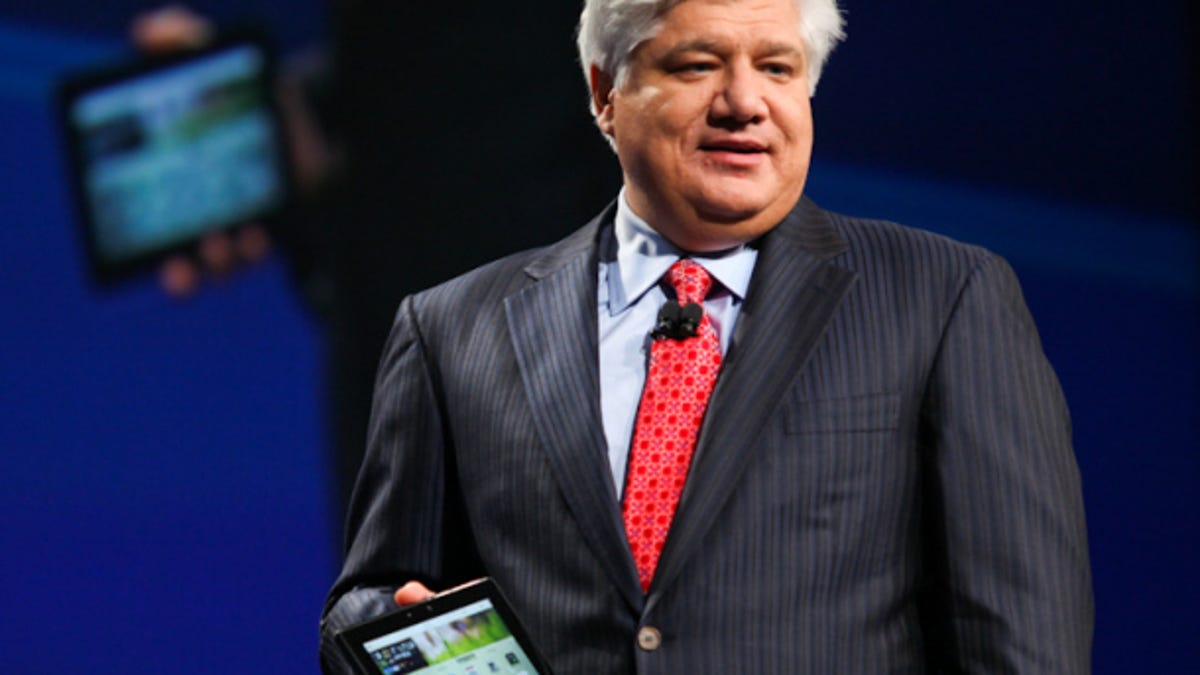RIM unveils its next-gen mobile OS: BBX
Co-CEO Mike Lazaridis made the case for developers to stick with RIM, saying BBX will combine the best of BlackBerry and the PlayBook tablet.

Research in Motion co-CEO Mike Lazaridis unveiled a new name for its next-generation operating system, BBX, as he made the case for developers to stick with BlackBerry.
BBX combines the best qualities of RIM's older BlackBerry operating system and its QNX platform, which powers the PlayBook tablet, Lazaridis said during the company's developer conference today.
RIM intends to use its BlackBerry DevCon conference to inject some life into its developer support, which is crucial to keeping its mobile ambitions alive. Lazaridis, in a number of demonstrations, promised an easier process for developers, more profits, and the ability to take advantage of platform's upgraded gaming engine, user interface and HTML 5 compatibility--all designed to lure interest away from Apple's iOS and Google's Android platforms.
"We're doing everything we can to make it easier than ever to submit apps and sign up," Lazaridis said. "We're removing roadblocks. This is a very exciting time for BlackBerry developers."
RIM is still trying to prove to developers that BBX is worth their time.
"With BBX, RIM is rebuilding the foundation for all its devices, including the iconic handhelds, and BBX begins to show some real promise in that sphere, with potential for a much more powerful, immersive and media friendly platform," said Jan Dawson, an analyst at Ovum Research.
But the PlayBook, which runs on its next-generation platform, got off to a rocky start in April after reviewers savaged it for omitting core BlackBerry services such as native e-mail and messaging and requiring software updates right out of the box. The carriers--traditionally a huge support line for RIM--also opted not to sell the tablet.
RIM shipped 500,000 PlayBook tablets in the initial quarter, but reported shipping only 200,000 devices in the most recently reported quarter, a disappointingly low number that was below even the most pessimistic forecast. A large drop in shipments indicates retailers are holding back on orders because they're having trouble selling the devices they have in stock.
RIM has already begun working with its retail partners to offer PlayBooks to customers at a discount. To further win over developers, each DevCon attendee will get a free tablet to aid in their development efforts.
RIM touts advantages Lazaridis attempted to appeal to developers' economic sensibilities, touting BlackBerry's geographic reach and the profitability of its aps.
"This is an amazing opportunity for developers," he said.
RIM said that since the inception of BlackBerry App World, RIM's app store, 1 billion apps have been downloaded from the store, with 140 million applications downloaded each month.
The company noted that apps running on BlackBerry 7 generate 11 times more gross average revenue per user than apps running on its older BlackBerry platforms. In addition, BlackBerry apps are downloaded significantly more times than on iOS or Android, it said.
There are far fewer BlackBerry apps available, which means the ones that exist stand out more. Lazaridis said BlackBerry apps are more accessible and more easily found than on rival platforms. He added there are more promotional opportunities.
App World is the second most profitable app store, ahead of Android, according to Alec Saunders, vice president of developer relations and ecosystem development for RIM. He added 13 percent of BlackBerry developers have made more than $100,000, compared with 1 percent of iOS developers who have made more than $1,000.
Saunders also introduced BlackBerry Jam, a program of services and resources designed to help developers.
"Are you ready to jam?" he said.
• RIM blew it: No BlackBerry PlayBook, phones today
• RIM to Android developers: C'mon in, the water's fine
• Hey RIM! Time to step it up with better BlackBerry freebies
Saunders concluded his presentation by putting his e-mail address up on the monitor, calling for feedback on how RIM is dealing with the development community.
RIM also showed off the technical capabilities of the platform through various demonstrations. The operating system's upgraded gaming engine and a user interface created by The Astronishing Tribe, or TAT, unit are accessible to developers, and the company said the process of porting over games or apps into the platform is easy thanks to its standards-based software.
"The native SDK is a big step forward in allowing developers to create applications which are truly optimized for these devices and which take advantage of all the hardware capabilities," Dawson said.
BBX will also work with HTML 5, which Lazaridis calls a bridge between the new platform and older BlackBerry 6 and 7 operating systems. The company acquired the HTML 5 capabilities through its purchase of mobile browser start-up Torch Mobile.
"We're making sure we have the best HTML 5 implementation in the world," Lazaridis said.
Another apology The RIM co-chief also reiterated his apology for recent service failures today as he kicked off the BlackBerry DevCon conference.
"The worldwide outages we experienced this week were unfortunate," he said.
It's been a tough few days for RIM. BlackBerry users last week had to deal with a system-wide outage that affected some customers for as many as three days--seemingly a lifetime in the dark for those who depend on e-mail as a critical communication tool. The disruptions finally ended last Thursday. In the meantime, rival Apple had a stellar launch over the weekend, selling 4 million iPhones as customers increasingly drop BlackBerrys.
RIM apologized for the disruption and yesterday said it would give $100 worth of premium apps away as a gesture of contrition. Enterprise customers would get a month of technical support for free.
Lazaridis thanked some of the development partners who were helping to supply apps to the free program.
Updated at 10:24 a.m. and 11:54 a.m. PT: with additional comments from Lazaridis and an analyst and more details from the developer conference.

